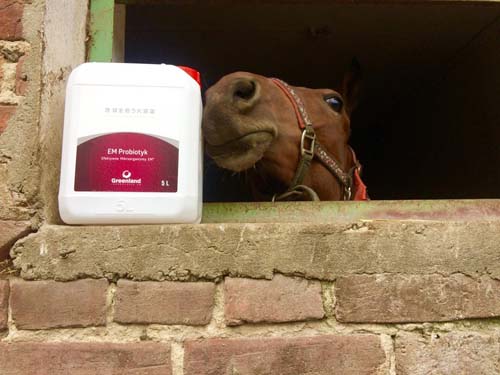Your basket is currently empty!

At Drwal Stables, located on the outskirts of Lublin, Poland, Mrs. Anna, together with her husband and father-in-law, has created an exceptional environment where the horses receive the best care. To ensure their health, the owners have opted for natural solutions – Effective Microorganisms (EM), which have been shown to be effective for years in preventing digestive problems and caring for the coat. Healthy horses with probiotics: Effective solutions for colic
How have probiotics transformed the health of horses at Haras Drwal?
The decision to regularly use the EM Probiotic was taken when one of the horses began to suffer from chronic colic. After the introduction of the probiotic, the horse recovered completely and its condition improved significantly. Since then, the product has become an essential part of the horse's diet at the stud farm. Thanks to this, owners can enjoy healthy animals that get sick less often and better absorb nutrients from the feed.
The structure of the horse’s digestive system – why does it require special attention?
When we look at the history of horse domestication, we can see that their diet varied depending on the region and time period. However, the anatomical structure of the digestive system has not changed in the last 5,500 years, since humans domesticated Przewalski's horses, tarpans and wild horses – the ancestors of all modern breeds.
The specific structure of the horse's digestive system has significant consequences and requires special attention from breeders. The highly developed cecum acts as a fermentation chamber for undigested food residues in the stomach and small intestine. The stomach's capacity can reach 15 liters. About 2/3 of its walls are covered by a glandular mucosa that produces acid, while 1/3 of the stomach is lined with a membrane sensitive to its action. Since the horse's stomach is rigid, it cannot contain large amounts of food. Therefore, the main digestive process takes place in the large intestine.
The bacterial flora of the large intestine of horses consists of more than 400 types of microorganisms that aid digestion. Their replacement and support are essential for the prevention and treatment of most diseases. Therefore, it is worthwhile – and in some cases, necessary – to include probiotics in the horse’s diet. The owners of Haras Drwal are among a growing number of breeders in Poland who use EM Probiotic as a natural support for the health of their horses.
Regular administration of this product brings several benefits, such as:
- Improved feed digestibility and macronutrient absorption – As a result, horses are able to make better use of the nutrients present in their food.
- Strengthening immunity and protecting against infections – In addition, regular use of probiotics helps to keep the immune system more resistant.
- Prevention and treatment of gastric colic and ulcers – This improves the digestive well-being of horses, preventing common problems.
- Maintaining proper pH in the digestive system – This ensures a balanced environment for healthy digestion.
- Reduced risk of laminitis, especially during dietary changes – Therefore, the health of the horses’ feet is protected, preventing serious complications.
- Increased appetite and improved taste of food – Consequently, horses feed better and more consistently.
How else can probiotics help?
- Improved skin and hoof health – In addition, the skin and hooves become stronger and healthier.
- Acceleration of wound healing and treatment of mycoses – This makes recovery processes faster and more efficient.
- Reduced stress and improved horse welfare – This results in calmer and more balanced animals.
- Neutralization of unpleasant odors in stables – Finally, the presence of probiotics helps to keep the environment more pleasant and healthy.
Healthy Horses with Probiotics: Effective Solutions for Colic.
| Scope of application | Dose | Observations |
|---|---|---|
| Adult horses | 50 – 100 ml of EM Probiotic or 50 – 100 g of EM Bokashi Probiotic | Daily with water, food or directly in the mouth; the dose can be divided in two and administered twice a day. |
| Foals and weaners | 20 – 50 ml of EM Probiotic or 20 – 50 g of EM Bokashi Probiotic | Daily by mouth; the dose can be divided into two and administered twice a day. In case of diarrhea, it is recommended to administer 20 – 50 g of EM Carbon Bokashi. |
| Spraying of boxes | 50 ml of 20% solution (e.g. 20 L/100 L water) per 1 m² | At least once a week; it is not necessary to take the horse out. |
Coat Care – Vivo Soap with Probiotic EM
At Drwal Stables, the horses not only enjoy good health, but also an impeccable appearance. To keep their coats in excellent condition, the Live Soap with a 10% solution of EM Probiotic.
Thanks to this soap, the horses' coat becomes:
Soft and shiny – especially important for horses participating in competitions
Healthy and hydrated – no irritation or excessive dryness
More resistant to mycoses and skin diseases – natural ingredients help regenerate the epidermis and promote beneficial microbe
Thanks to the use of Live Soap In their daily care, horses have a soft and shiny coat. As a result, they look stunning, which is extremely important during competitions.
Conclusion
The owners of Drwal Stables have shown that natural probiotics are an effective way to keep horses healthy and happy. Therefore, regular use of EM Probiotic supports the digestive system, strengthens immunity and improves the appearance of animals.
Additionally, if you want to take care of your horse's health naturally, it's worth including probiotics in their diet and care routine!
Finally, watch the video about the Drwal stable here.

